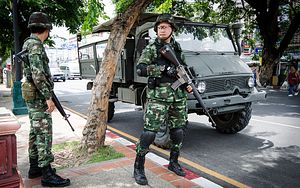This past week, the Thai military launched its second coup in a decade, destroying what was left of Thailand’s shaky democratic system. This coup is likely to last longer and be much harsher than the coup in 2006; already, the Thai armed forces are censoring Thai media and putting journalists and politicians in detention or in jail.
Thailand’s return to military rule was hardly fated to happen. Between the late 1980s and the late 2000s, many countries in Southeast Asia were viewed, by global democracy analysts and Southeast Asians themselves, as leading examples of democratization in the developing world. By the late 2000s, Thailand, Malaysia, Indonesia, the Philippines, and Singapore all were ranked as “free” or “partly free” by the monitoring organization Freedom House, while Cambodia and, perhaps most surprisingly, Myanmar had both taken sizable steps toward democracy as well.
Yet since the late 2000s, Southeast Asia’s democratization has stalled and, in some of the region’s most economically and strategically important nations, gone into reverse. Over the past ten years, Thailand has undergone a rapid and severe regression from democracy and is now ruled by a junta. Malaysia’s democratic institutions and culture have regressed as well, with the long-ruling Barisan Nasional (BN) coalition cracking down on dissent and trying to destroy what had been an emerging, and increasingly stable, two-party system. In Cambodia and Myanmar, hopes for dramatic democratic change have fizzled. Only the Philippines and Indonesia have stayed on track, but even in these two countries democratic consolidation is threatened by the persistence of graft, public distrust of democratic institutions, and continued meddling in politics by militaries.
Southeast Asia’s rollback from democracy reflects a worrying global retrenchment toward anti-democratic political change. The implications of this regression from democracy are significant. On a human level, the regression from democracy means that, compared to a decade ago, more of the world’s people are living today under authoritarian or hybrid, semi-authoritarian regimes. People living under authoritarian rule are more likely to have shorter and less healthy lives, as shown by indicators of human development.
An increasingly authoritarian and unstable Southeast Asia is also a poor partner for the United States. Southeast Asia contains U.S. treaty allies Thailand and the Philippines, increasingly critical U.S. partners Singapore and Vietnam, and potentially valuable strategic partners like Indonesia, Malaysia, and Myanmar. Southeast Asia has become one of the largest engines of global growth, and the United States and several Southeast Asian nations are attempting to complete the Trans-Pacific Partnership (TPP), which would be the largest free trade area in history in terms of gross domestic product (GDP).
Regression from democracy will endanger all of this cooperation. History shows that the United States works most effectively around the world with other democracies, as demonstrated in organizations like the North Atlantic Treaty Organization (NATO). The United States’ partnerships with the more democratic nations in Southeast Asia follow this trend—these relationships tend to be more stable than U.S. relationships with more brittle and autocratic Southeast Asian regimes. Stronger democratic governments, including those in Southeast Asia, also usually can deliver the kind of long-term economic liberalization critical to foreign investment, since these economic reforms are not just implemented by fiat. If this democratic rollback continues, it is likely to seriously endanger American security cooperation in East Asia, undermine the region’s growth and economic interdependence, and cause serious political unrest, even insurgencies, in many Southeast Asian nations.
In my new working paper, I examine the severe regression from democracy now happening in Southeast Asia, the implications of this trend for the region and the United States, and some possible solutions to this democratic reversal. The working paper is available here.
Joshua Kurlantzick is a fellow for Southeast Asia at the Council on Foreign Relations. He blogs at Asia Unbound, where this piece originally appeared. You can follow him on Twitter: @JoshKurlantzick

































